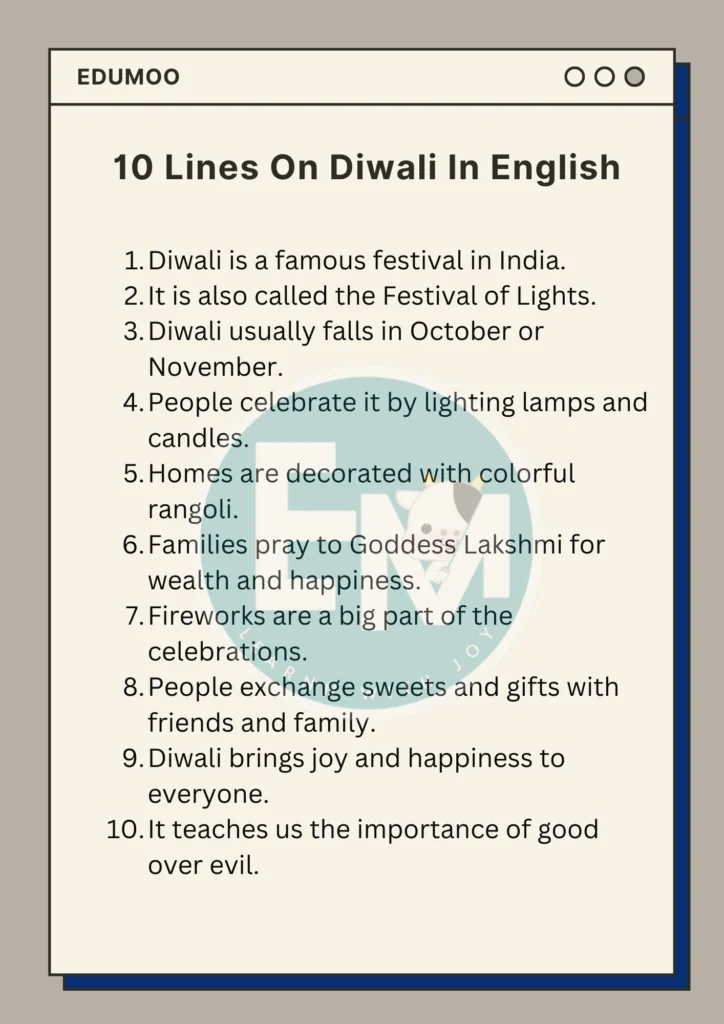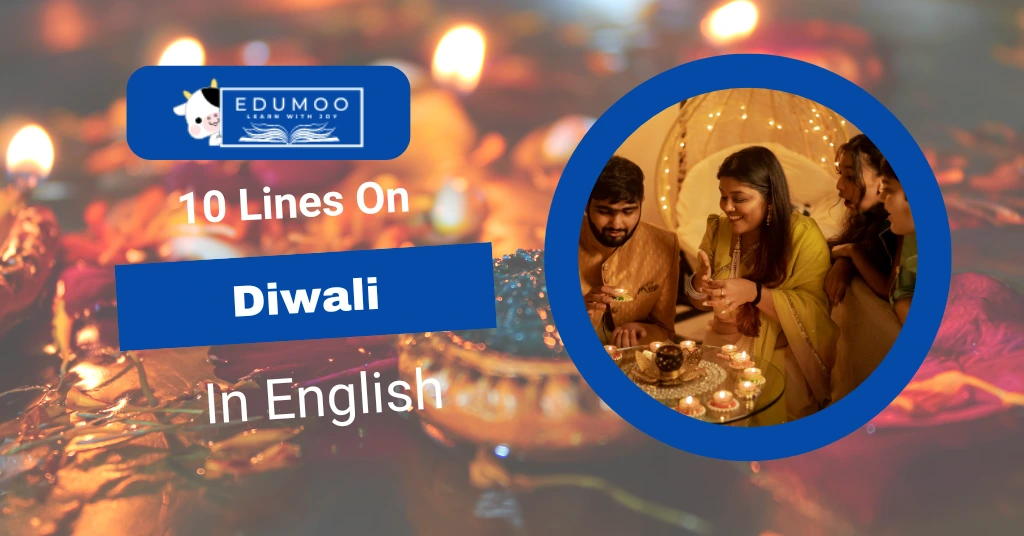Diwali, also known as the Festival of Lights, is one of the most exciting festivals celebrated in India. This beautiful festival usually takes place in October or November. During Diwali, people light lamps and candles, making their homes bright and joyful. Families come together to pray, share sweets, and enjoy fireworks. In this blog, we will learn about 10 lines on Diwali and its importance. Let’s explore this wonderful festival and understand why it is so special!
10 Lines On Diwali In English
- Diwali is a famous festival in India.
- It is also called the Festival of Lights.
- Diwali usually falls in October or November.
- People celebrate it by lighting lamps and candles.
- Homes are decorated with colorful rangoli.
- Families pray to Goddess Lakshmi for wealth and happiness.
- Fireworks are a big part of the celebrations.
- People exchange sweets and gifts with friends and family.
- Diwali brings joy and happiness to everyone.
- It teaches us the importance of good over evil.

Essay On In Diwali English In 250 Words
Diwali, known as the Festival of Lights, is one of the most important festivals celebrated in India. It usually takes place in October or November and lasts for five days. This festival represents the triumph of light over darkness and good over evil. Diwali marks the return of Lord Rama to his kingdom after defeating the demon king Ravana. To celebrate, people light oil lamps called diyas and decorate their homes with colorful rangoli designs.
On the evening of Diwali, families worship Goddess Lakshmi, the goddess of wealth and prosperity. People clean and decorate their homes to invite her in. The bright lights and decorations make everything feel festive, bringing joy and happiness to everyone. Fireworks are also an important part of the celebrations. The night sky lights up with colorful bursts, adding to the excitement of the festival.
Exchanging sweets and gifts is another tradition of Diwali. Families and friends visit each other to share delicious treats and express their love. This festival helps strengthen bonds among people and encourages kindness and generosity. Children enjoy dressing up in new clothes and participating in the festivities.
In conclusion, Diwali is not just a festival of lights; it is a time for families to come together and celebrate love, joy, and harmony. It reminds us to spread positivity and choose goodness in our lives. As we celebrate Diwali, let us cherish the moments with our loved ones and spread happiness to everyone around us.
| Also Read: 10 Lines on Halloween Day |
Essay On In Diwali English In 900 Words
Diwali, also known as the Festival of Lights, is one of the most popular and widely celebrated festivals in India.
This beautiful festival usually falls in October or November and lasts for five days. Diwali is a time for joy, celebration, and coming together with family and friends. It is a festival that holds great significance in Hindu culture and is celebrated with much enthusiasm all over the country.
The story behind Diwali is very interesting. It is celebrated to mark the return of Lord Rama, his wife Sita, and his brother Lakshmana to their kingdom of Ayodhya after defeating the demon king Ravana. Lord Rama represents the victory of good over evil. When he returned home, people of Ayodhya welcomed him by lighting lamps and bursting fireworks. They decorated their homes with flowers and rangoli, which are colorful designs made with colored powders or rice. This tradition continues today, as families across India light diyas (small oil lamps) and decorate their homes with bright colors.
The preparations for Diwali begin well in advance. People clean their homes thoroughly, believing that Goddess Lakshmi, the goddess of wealth and prosperity, will visit their homes on this auspicious day. Many families buy new clothes, sweets, and decorations to prepare for the festival. Shops and markets are filled with colorful items, and the atmosphere is lively and vibrant. Everyone seems excited, and the air is filled with the scent of sweets being made.
On the main day of Diwali, families perform prayers (puja) to honor Goddess Lakshmi. They set up beautiful altars with idols of the goddess and offer sweets, fruits, and flowers. People light diyas and candles around their homes to chase away darkness and bring in positivity and happiness. The lighting of these lamps is symbolic of the inner light that protects us from spiritual darkness. As night falls, the sight of houses illuminated with lights creates a magical atmosphere.
Fireworks are another essential part of Diwali celebrations. The night sky fills with colorful bursts of light as people set off firecrackers. Children especially look forward to this part of the festival, as they enjoy bursting crackers and watching the beautiful displays. However, it is also essential to be responsible while celebrating with fireworks to ensure the safety of everyone and to protect our environment.
During Diwali, people exchange gifts and sweets with family, friends, and neighbors. This act of sharing helps strengthen bonds and spread joy. Many families prepare delicious sweets and snacks like ladoos, barfis, and namkeen to share with their loved ones. Some people also send greeting cards or messages to wish others a happy Diwali. This tradition of giving and receiving gifts symbolizes the spirit of love and unity during the festival.
In addition to the celebrations, Diwali also teaches us important values. It reminds us to choose the path of goodness, honesty, and integrity. Just as Lord Rama fought against evil, we must strive to overcome negativity and darkness in our lives. Diwali encourages us to be kind to others and to help those in need. Many people take this opportunity to donate to charities and support the less fortunate during this festive season.
Moreover, Diwali is celebrated by people of different religions and cultures in various ways. In some parts of India, people worship different deities, while in others, they focus on family gatherings and feasts. For example, Sikhs celebrate Bandi Chhor Divas on the same day, which commemorates the release of Guru Hargobind Ji from imprisonment. Regardless of the specific customs, the essence of Diwali remains the same: it is a time for joy, togetherness, and the triumph of light over darkness.
The environmental impact of Diwali is a topic of discussion as well. While the festival is filled with joy and celebration, the use of fireworks can contribute to air and noise pollution. Many people have started advocating for a green Diwali by opting for eco-friendly celebrations. This includes using fewer firecrackers, opting for clay diyas instead of plastic lights, and focusing on sustainable decorations. By making these small changes, we can ensure that our celebrations do not harm the environment.
In recent years, social media has also played a role in how people celebrate Diwali. Families who live far apart can connect through video calls and social media platforms. They can share their celebrations, show off their decorations, and send virtual greetings. This connectivity helps everyone feel included, regardless of distance. Social media has also been a platform for spreading awareness about celebrating a more environmentally friendly Diwali.
As the festival comes to an end, it leaves behind beautiful memories. The laughter, the joy of sharing sweets, the sparkle of lights, and the warmth of family gatherings all create a magical experience. People often look forward to this time of year, as it brings happiness and a sense of belonging. Diwali is more than just a festival; it is a celebration of life, love, and the bonds we share with one another.
In conclusion, Diwali is a festival that brings joy and unity to everyone. It teaches us the importance of goodness and the power of light. As we celebrate this special occasion, let us remember to spread happiness and kindness to all around us. Whether through the lighting of diyas, the sharing of sweets, or simply spending time with loved ones, Diwali reminds us of the beauty of togetherness. May this Festival of Lights fill our lives with happiness, peace, and prosperity. Happy Diwali to everyone!
Conclusion
Today, we have learnt 10 lines on Diwali. Diwali is a time for fun, happiness, and being together. It is a festival that helps families and friends bond more closely. The lights and decorations make everything look magical, and the prayers remind us of the importance of good values. As we celebrate Diwali, let us remember to spread love and happiness. This festival teaches us to choose the path of goodness and light in our lives. Happy Diwali to everyone!

